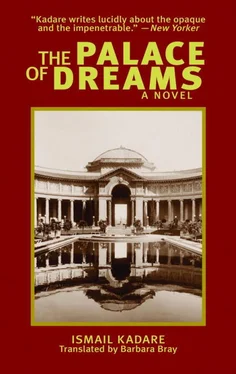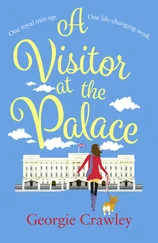“Yesterday the Master-Dream officers were down here researching till late at night,” the archivist told him, lowering his voice. “There’s nothing surprising about that. All the great disasters are gathered together here, beginning with what some peoples have recently taken to calling ‘national renaissance.’ This refers, you understand, not to the resurrection of a dead person, but to that of a whole nation—the sort of thing one daren’t even name…. Dreams dreamed on the eve of bloodshed, you said?”
“Yes, that’s right.”
“Here are the files on that. Most of them are dreams dreamed on the eve of battles, some of them just before dawn.…The battle of Kerk-Kili…The battle of Bayazit Yeldrum, against Tamburlaine. The two Hungarian campaigns…”
“Is the battle of Kosovo here?” asked Mark-Alem faintly.
The archivist looked up.
“You mean the first, in 1389, against all the Balkans, if I’m not mistaken?”
“Yes, that’s right.”
“It’s bound to be there. Wait a moment.”
He turned and disappeared among the groaning shelves, evidently to look for the assistant on duty in this section. He soon came back with him.
“This is where they keep the seven hundred or so dreams about it, dreams dreamed on the eve of the fateful day,” said the archivist, glancing alternately at Mark-Alem and the assistant, whose head, with its emaciated features, nodded in agreement with every word he said.
“There should have been more of them, but they’ve probably been lost,” said the assistant in a piping voice. “What’s more, a lot of those that are left are very sketchy, as dreams scribbled down in the early hours may well be.”
“Really?” exclaimed Mark-Alem eagerly.
He’d often heard his family speak of the tragic battle.
“The Master-Dream itself was chosen in haste, so that it could be brought to the Sultan’s tent at daybreak.”
“Did they have time to choose a Master-Dream?” asked Mark-Alem, amazed.
“Of course. How could they do otherwise?”
“And is it here?”
“No, it’s kept with the others in the Master-Dreams office.”
“We’ll be going there too—don’t worry,” said the archivist.
“I can describe it to you more or less,” said the assistant, his voice thinner than ever. “Only if you’re interested, of course…”
“Yes, of course!”
The archivist looked at him briefly and lowered his eyes sympathetically. How could you not be interested, his expression said, seeing that you’re a Quprili.
“A soldier dreamed he saw a friend of his who’d been killed sometime before, and the friend beckoned him over behind an embankment. ‘What are you doing there all on your own?’ said the friend. ‘Aren’t you bored? Why don’t you come and join us? Most of us are over here…’” The assistant related this in a voice that really did seem to come from beyond the grave. “That meant that the battle would be particularly bloody—as indeed it was.”
“No, it was certainly no joke,” put in the archivist. “The whole Balkan army was wiped out.”
Mark-Alem looked from one of his interlocutors to the other.
“Even now, after five centuries, the Balkan peoples often dream of that battle,” said the assistant. “Or so I was told by a friend of mine who works on the ‘dark people. ’”
“It’s quite understandable,” observed the archivist, his eyes fixed on Mark-Alem.
“Do you want us to open the files?” asked the assistant.
“No, not now,” said the archivist. “We’ll come back in a little while, won’t we?” He turned to his young companion. “Let’s take a look at the Archives as a whole, and then you can come back here and stay as long as you like.”
Mark-Alem agreed.
They went back into the passage. The archivist’s voice was accompanied by an echo again.
“Now… ow… ow… we’re going to see… oo see… oo see… the Ottoman… an… an… archaeo-dreams… earns… earns.…”
“What are they?” asked Mark-Alem after they’d gone through a door and the archivist’s voice sounded normal again.
“Old Ottoman dreams,” he answered. “The earliest dreams of the founders of the Empire. Hence archaeo-dreams.”
“Have they been preserved?”
“Up to a point,” said the archivist. “To the same extent as ancient murals can be. They’re here in these files.”
Mark-Alem made a little bow to the silent clerk who had appeared from between the shelves.
“There aren’t very many of them, which makes them all the more valuable,” the archivist went on. “But as a matter of fact they’ve come down to us in such a mutilated form that it isn’t possible to learn much from them. Although there have been a number of attempts to restore them, like old frescoes, they’re still more or less what they always were— disjointed visions, without any connections between them. Nevertheless, they’re sacred, inasmuch as they served as the basis of the State. The present interpreters often come down and look at them, to get inspiration from the way they were explained. Isn’t that right, Fouzoul?” he asked the clerk.
“That’s right,” said the other. “Several of them were here till quite late last night.”
“Interpreters from our section?” inquired Mark-Alem.
“From the Master-Dream office. Is that where you work?”
Mark-Alem blushed.
“No—I’m in Interpretation.”
“The Master-Dream officers seem to have been everywhere last night,” observed the archivist—rather pointedly, Mark-Alem thought. “Thank you, Fouzoul.”
He led the way out.
“It’s hard to get any meaning out of the archaeo-dreams, even after they’ve been restored,” he said. “I’ve seen some of them, and they struck me as completely washed-out, like old tapestries where you can’t make out the picture anymore. Yet the interpreters spend hours and hours poring over them.”
The archivist laughed to himself.
“But I’d bet you anything they don’t understand a thing! They just stay there pretending to rack their brains trying to find hidden meanings, and all the time what they’re really doing is thinking about their little problems at home, the inadequacy of their salaries, and so on. Ah, here are the Master-Dreams at last!”
Mark-Alem shuddered as though his companion had shown him a nest of vipers—only these had spent their venom long ago. Even so, they still seemed fearsome.
“There are about forty thousand of them altogether,” sighed the archivist. “Allah!”
Mark-Alem sighed too.
“And now,” said the other, “let’s go and see the Sovereign’s dreams.”
Mark-Alem expected to find a room that was particularly impressive, but it was just the same as the rest. There was nothing special about the shelves and so on; the only difference was that the files had the Emperor’s seal on the cover. Above the seal was written the name of each Sovereign: Dreams of Sultan Murat I; Dreams oj Sultan Bajazet; Dreams of Sultan Mehmet II; Dreams oj Sultan Solyman the Magnificent…
“These files can be opened only on the Sovereign’s orders,” said the archivist. “Anyone breaking the rule has his head cut off.”
He drew the edge of his hand across his throat.
They went on and visited rooms containing dreams of the giaours and of profound captivity. Also others devoted to anxieties (there were three big rooms full of those) and to hallucinations (there had been long debates about whether or not they really ought to be examined in the Tabir Sarrail at all). In the last room were the dreams of the insane.
“Well, I think you’ve got some idea of the Archives now,” said the archivist as they left.
Читать дальше












